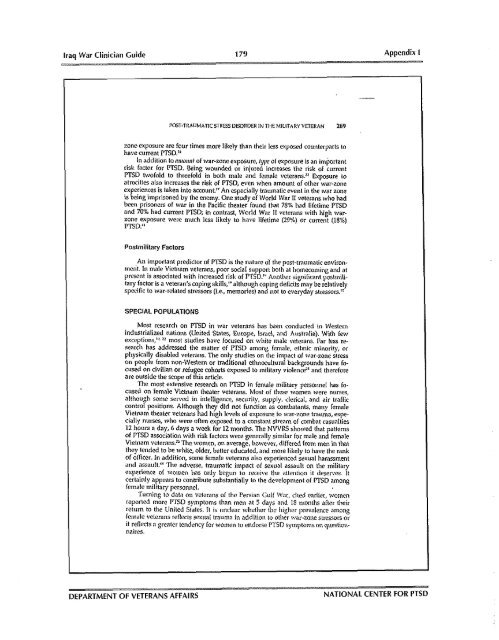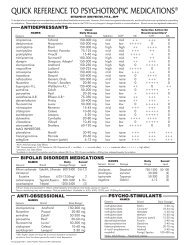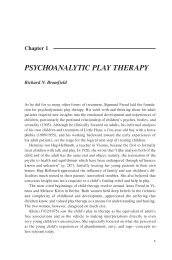IRAQ WAR CLINICIAN GUIDE
Iraq War Clinician's Guide - Network Of Care
Iraq War Clinician's Guide - Network Of Care
You also want an ePaper? Increase the reach of your titles
YUMPU automatically turns print PDFs into web optimized ePapers that Google loves.
Iraq War Clinician Guide 179 Appendix I<br />
p----<br />
POST-TRAUMAnCSTRESDISOtlDER IN TllE MILITARY VFlEllAN 269<br />
wneexposure are four times more likely than their less exposed counterparts to<br />
have current FTSD.n<br />
Inaddition ton~~ro~r,~l of war-zone exposure, lypc 01 exposure is an important<br />
risk factor for PTSD. Being wounded or injured increases the risk of current<br />
PTSD twofold to threefold in boll1 male and female veterans." Exposure to<br />
atrocities also increases the risk of PTSD, even when amount of other .war-zone<br />
experiences is taken intoaccount!" An especially traumalicevent in the war zone<br />
is being imprisoned by the enemy. One study of World War 11 veterans wlio had<br />
been prisoners of war in the Pacific theater found that 78% had lifetime FED<br />
and 70"' had current MSD; in contrast, World War I1 veterans with high warzone<br />
exposure were much less likely to have lifetime (29%) or current (IS"/.)<br />
mD."<br />
Poslmililary Factors<br />
An important predictor of PTSD is the nalun? af the post-traumatic environmelit.<br />
In axale Viehram veterans, poor social support botll a1 homecoming and at<br />
prescnt is associated with increased risk of PI'SD.'" Anotltcr significant postmilitary<br />
factor is a veteran's copingskills," although coping deficits may be relatively<br />
specific to war-related slrussors (i.e., memories) and not to cvcryday streswrs."<br />
SPECIAL POPULATIONS<br />
Most research on FTSD in war veterans has beerr conducted in Western<br />
industrialized naliotl~ (United States, Europe, Ismel, and Aostri~lia). Witlr few<br />
exceptions."lZi most studies have focused on i\.hite male veterans. Far less research<br />
has addressedthe matter of I'EU among female, ethnic minority, or<br />
physically disabled veterans. The only studies on the impact of war-zone slress<br />
on people from non-Western or traditional etlmwultural backgrounds have focused<br />
on civilian or refugee cohorts exposed lo mililary violencLJs and therefore<br />
are outside the scope of this article.<br />
The nrost extensive research on FTSD in fenrale military ycrsonnel has focused<br />
on female Viemani theater vetelans. Most of these women were nurses,<br />
although some sci~,cd in intelligence, secilrily. supply. clerical, and air traffic<br />
control positions. Althougl~ they did not function as combatants, many female<br />
Vietnam theater veterans had high levels of exposure to war-zone trauma, especially<br />
nurses, who were often expo& to a constant stream of combat casualtics<br />
12 hours a day, 6 days a week for 12months. The NVVRS showed that patterns<br />
of PTSD association with risk factors were generally similar for male and female<br />
Vietnam vel~rens.~'The women,on average, howe\,er, differed from men in that<br />
they tended to be rvhite, older, better educated, and more likely to have the rank<br />
of officer. In addition, some female wlerans also experienced sexual harassment<br />
and assault.'* 'rite adverse, traumatic impact of sexual assault on the mililary<br />
experience of womm has only begun lo receive the aNe11lioir it deserves. It<br />
certainly appears to contribute substantially to the de~~elop~nent of PTSD among<br />
fernale n~ilitary persolurcl.<br />
Turning to data on velerans of the Persian Ctdf War, cited earlier, women<br />
reported more PrSD symptoms than nrca at 5 days and 18 months aftcr their<br />
return to the United States. It is i~nclrar whether the higher prevalence among<br />
female veterans reflects sexual tmuma in addition lo other rvar-zone stressors or<br />
it rellccls n greatcr tendency for women to e~rdorse PTSD syinptomsonquestior!-<br />
naires.<br />
DEPARTMEhT OF VETERAhS AFFAIRS<br />
.... -.u~..---..L-..-m"<br />
NATIONAL CENTER FOR PTSD




